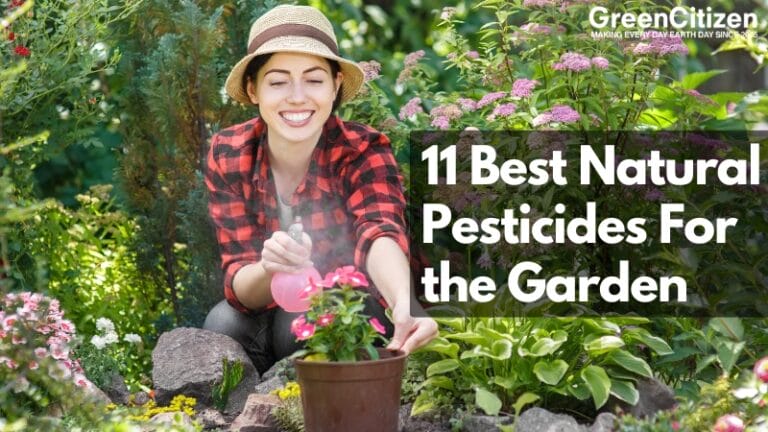Natural pesticides for the garden are plant- or mineral-based pest controls (and a few gentle household solutions) that help reduce aphids, mites, beetles, and other common invaders—without relying on harsh synthetic chemicals. The key is using the right option for the right pest, applying it at the right time, and protecting pollinators and your plants from spray damage.
In this guide, I’ll show you 11 natural pesticide options that gardeners commonly use, what each one is best for, and a quick pest-matching chart so you can choose fast. I’ll also share a simple safety checklist so you get results without harming your garden.
Key Takeaways
- Eco-Friendly & Safe: Natural pesticides like Neem oil and dish soap effectively eliminate garden pests while remaining non-toxic to pets, humans, and pollinators.
- Mechanical Action: Unlike chemicals, these organic solutions work physically—by suffocating or dehydrating insects—which prevents pests from developing resistance.
- Consistent Application: To maximize effectiveness with natural pesticides for the garden, apply treatments during early morning hours and reapply every 5–7 days or after rain.
11 Natural Pesticides That I Used and WORKED!
1. Mild Dish Soap Spray
A mild soap-style spray helps control soft-bodied pests by disrupting their protective outer layer. It’s commonly used for aphids, whiteflies, and mites, but should be spot-tested first to avoid leaf damage.
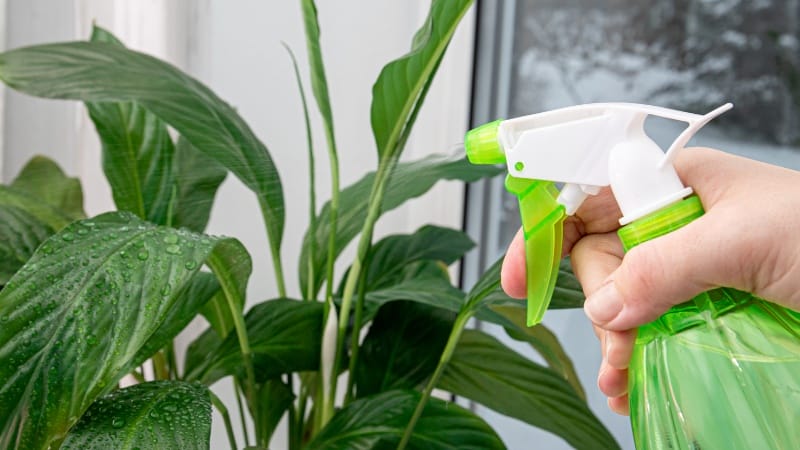
DIY bug killer #1 is the option I would never have thought of on my own — a huge shout-out to my friend for helping me discover this easy, DIY, natural pesticide.
Dish soap is one of the most common household ingredients, so it won’t cost you an arm and a leg to make.
Best of all, it’s easy to make and perfect for blasting bugs.
How to Apply Soap Spray to Plants
In a large container, mix one and a half teaspoons of mild liquid dish soap with one quart of water. Pour the mix into a spray bottle or a garden sprayer and spray the infected surface of the plant.
Spray the undersides, tops of leaves, stems, buds and blooms thoroughly. Repeat every 7 to 14 days until you’ve gotten rid of the pests.
Cover the top and bottom of the leaf with the spray, and use it in the early morning or evening. Don’t spray in the middle of the day when plants are exposed to heat and direct sunlight.
What Is Dish Soap Good Against?
The dish dish is good against aphids, mites, beetles, and whiteflies.
Pro Tip: Don’t use soap with bleach as it’ll harm the plants. Be careful with how much soap you use, as too much soap can ruin the plants.
2. Vegetable Oil Insecticide
Oil-style sprays work by coating pests and interfering with breathing, making them useful for aphids, mites, and some whiteflies. Apply during cooler parts of the day and avoid spraying stressed plants to reduce burn risk.
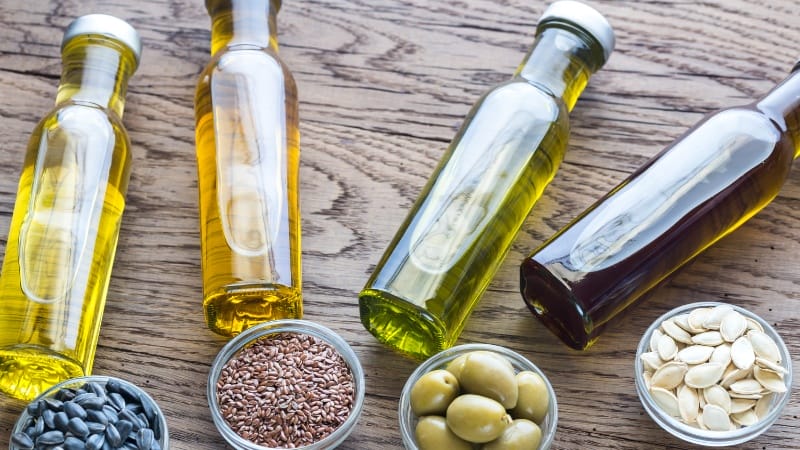
The second on the list of homemade pesticides is vegetable oil spray. It’s similar to the soap dish in how it’s made and used, and it also contains soap.
The combination of oil and soap coats the insect’s body and suffocates it by blocking the pores through which the insect breathes. I know it may sound cruel, but think about what the pest is doing to your precious plants.
According to Colorado State University, soybean oil, commonly used for cooking, is good in combating insects and mites. However, cottonseed oil is considered to be the most effective.
How to Mix Vegetable Oil Spray
Mix one cup of vegetable oil and one tablespoon of mild soap. When mixed well, add two teaspoons of the mix to one quart of water. Pour into a spray bottle or a garden sprayer, and shake thoroughly.
Then spray the top and bottom of each leaf, and if necessary, the stems.
Same as with the soap dish, don’t apply during the heat of the day, but in the early morning or evening.
What Is Vegetable Oil Spray Good Against?
Vegetable oil is good against aphids, beetles, whiteflies, thrips, and mites.
Pro Tip: Pause and shake the spray bottle several times during the application. You want to ensure the soap, water, and oil are mixed.
3. Eucalyptus Oil Repellent
Eucalyptus oil is often used as a strong-scent botanical repellent and may help deter certain insects. Because essential oils can be harsh on foliage, spot-test first and avoid spraying open blooms to protect pollinators.
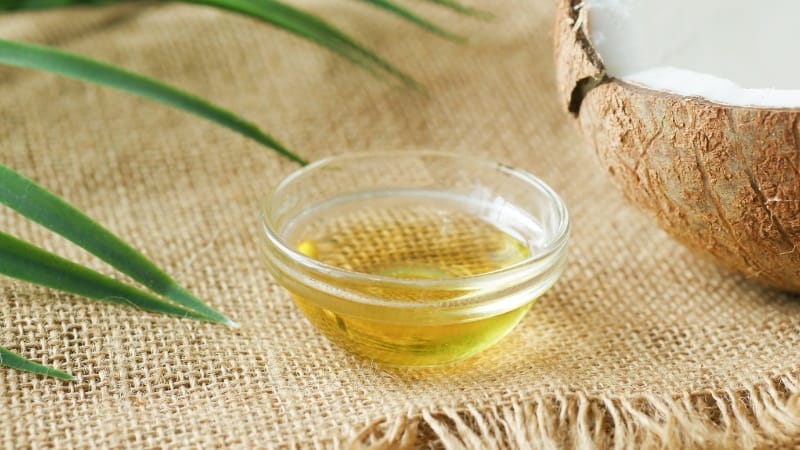
Eucalyptus oil is traditionally used in commercial medicines. It has a warm and earthy smell, and it can relieve stress. However, it can relieve pests as well as stress.
I found numerous studies that claim it can be safely used as a pesticide.
I decided to give it a try and was vowed with the results! Especially, I like that it can be used in many different ways.
Three Ways to Use Eucalyptus Oil in the Garden
You can apply eucalyptus oil to plants in three different ways:
Repel — Many insects, such as ants, avoid strong smells such as eucalyptus. Use ¼ teaspoon of eucalyptus oil in one cup of water. Put the mixture in a spray bottle and shake well to mix. Apply to infected plants every three days.
Eliminate — If you want to kill off the insects, combine one teaspoon of eucalyptus oil with half a teaspoon of liquid dish detergent and 2 cups of water. Pour in a spray bottle, and shake well. Apply to plants every three days until the insects are gone.
Mulch — You can use shredded or chipped eucalyptus wood. Eucalyptus wood contains eucalyptus oil. As the mulch breaks down, it’ll release the oil. This can take weeks, so you’ll be insect-free for a long time. If you can’t find eucalyptus mulch, use pine mulch and spray eucalyptus oil.
What Is Eucalyptus Oil Good Against?
Eucalyptus oil repels mosquitoes, ants, gnats and kills aphids, whiteflies, mites, and earwigs.
Pro Tip: Pause and shake the spray bottle several times during the application. You want to ensure the soap, water, and oil are mixed.
4. Neem Oil (The Ultimate Natural Pesticide)
Neem oil is a popular natural pesticide for the garden because it can deter feeding and disrupt life cycles for many common pests. It’s best used early in an infestation and applied carefully to avoid harming beneficial insects.
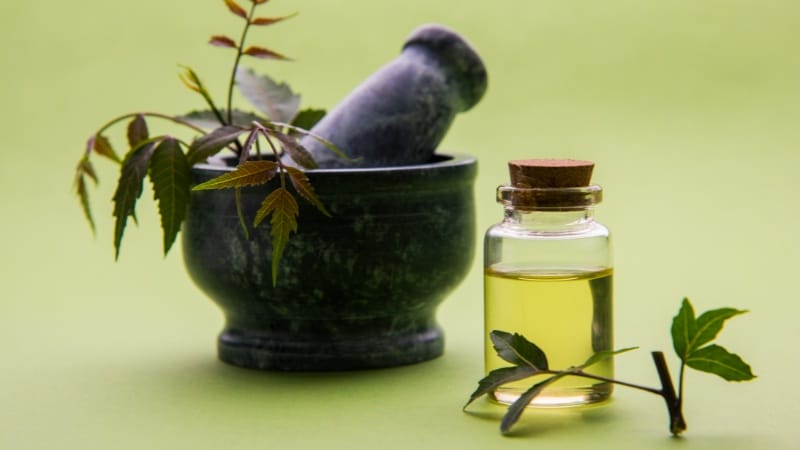
Neem has a long history of being used in medicine and cooking. However, it’s also good as a pest deterrent and can treat other garden diseases like powdery mildew and rust.
It has a bitter taste and a strong odor that helps keep the pests away from your garden. It’s also biodegradable and non-toxic for people, animals, and plants.
How to Apply Neem Oil Safely
Neem oil is widely available at garden stores or natural food markets.
To apply it, follow the manufacturer’s instructions.
You can also make your own. For 1 liter of neem oil, use 1 quart of warm water, 1 teaspoon of neem oil, and two teaspoons of mild liquid soap.
Mix water and soap, and shake them well, so the soap dissolves. Then add the neem oil and shake again.
You’ll get a neem oil pesticide with a concentration of 0.5%. If you need a stronger concentration, you can add more neem oil. Be careful how much neem oil you use, as too much can burn the plant. If you buy it, always follow the manufacturer’s instructions.
Use the mixture to spray the affected plant leaves.
You can also use neem preventively on young plants before they get infested. It’s effective for 22 days.
What Is Neem Oil Good Against?
Neem oil is effective against 600 insects. Some of them are caterpillars, aphids, beetles, mealybugs, scale, and thrip.
5. Capsaicin Pepper Spray
Pepper-based sprays can deter some insects and animals due to capsaicin’s irritant effect. Use cautiously and avoid spraying flowers or windy conditions to reduce impact on pollinators and people nearby.
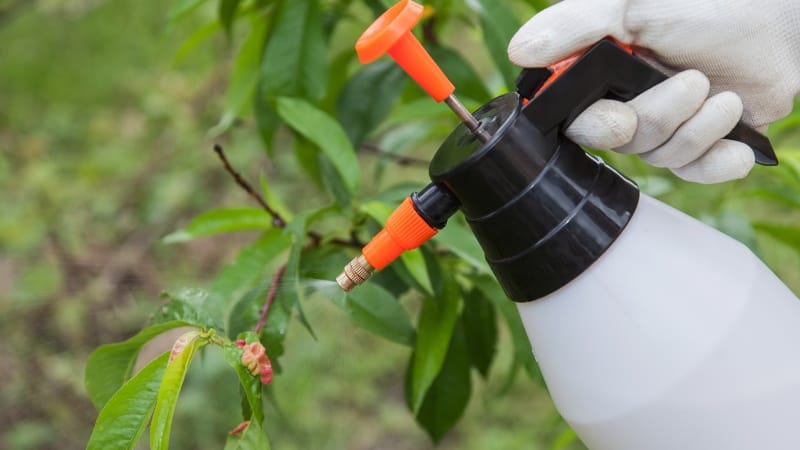
Pepper spray has capsaicin, the compound that gives peppers the hot taste.
It can be used to repel mammals. If you live in an area with deers who like to munch on your plants, this is the solution you’re looking for. Capsaicin also kills insects by causing membrane damage and metabolic disruption.
Many insects will sense the pepper spray and will avoid the treated plants.
How to Make Homemade Pepper Spray
You should wear gloves and a mask when making and applying pepper spray because it can cause discomfort in the eyes.
To be on the safe side, avoid applying on a windy day.
Mix two tablespoons of red cayenne pepper or paprika with a gallon of water. Then add six drops of mild dish soap. This helps the solution bind.
Pour the mixture into a spray bottle, and apply at dusk. Spray until there’s a nice coat over the foliage and underside of the leaves. Repeat every 3 to 5 days and after a rainfall.
What Is Pepper Spray Good Against?
Pepper spray is good against spider mites, aphids, and deer.
Pro Tip: This spray can hurt the honey bees, so use it once they’ve gone back to the hive in the evenings.
6. Garlic Spray Repellent
Garlic is primarily a repellent that can help discourage certain insects from settling on plants. It’s most effective when used preventively and refreshed regularly, rather than as a one-time “wipeout” spray.
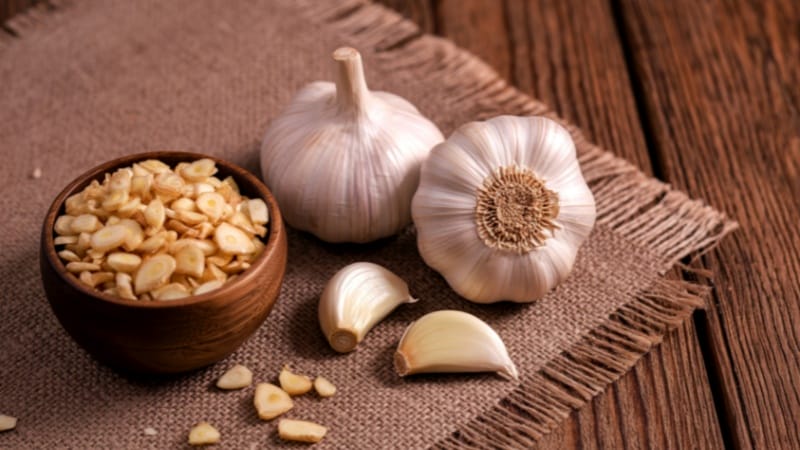
Garlic is famous for its aroma, which people either love or hate.
It’s exactly this aroma that puts garlic on the list of organic pesticides for vegetables.
Actually, garlic isn’t so much a pesticide as an insect repellent. But, the important thing is, it works!
I wasn’t a fan of my garden smelling garlicky, and it did make me cut down on the time I spent there, but it worked like a charm for getting rid of pests.
How to Create a Garlic Barrier
You can plant garlic around your vegetable beds, or in them, together with other vegetables to make sure the insects stay away.
Or, you can make a garlic spray.
Take two garlic cloves and put them in a blender or a food processor with a little water. Let it sit overnight, then strain. Add a teaspoon of liquid soap and a half cup of vegetable oil. Put in enough water to fill a cup.
Use the mixture with one quart of water and pour it into a spray bottle.
Spray tops and bottoms of leaves once a week.
What Is Garlic Spray Good Against?
Garlic spray is good against ants, slugs, aphids, beetles, and whiteflies.
Pro Tip: Something I discovered too late — don’t spray close to harvest, or your veggies will taste garlicky!
7. Tomato Leaf Spray (Alkaloids)
Tomato leaves contain natural compounds that can be toxic to some pests, particularly aphids. Because nightshade plant compounds can be irritating, use carefully, keep away from kids/pets, and avoid broad spraying on edible surfaces.
If aphids are your primary concern, I’ve found tomato leaf spray works like a charm!
Tomato plants belong to the nightshade family, which means they have toxic compounds known as alkaloids in the leaves.
When the leaves are chopped, the alkaloids are released. You can use the leaves to make a spray that’s toxic to aphids but safe for people and other plants.
Best of all, this spray is believed to attract beneficial predatory insects that’ll help your tomatoes flourish.
Extracting Alkaloids for Pest Control
To make the tomato leaf spray, chop two cups of tomato leaves and soak them in a quart of water overnight.
Then strain the leaves with a cheesecloth or a strainer. Pour the water into the spray bottle and apply to stems and foliage.
What Is Tomato Leaf Spray Good Against?
Tomato Leaf Spray works best against aphids.
Pro Tip: Apply liberally to the underside of the leaves, as this is where aphids like to congregate. Apply also to stems and growing tips.
8. Magnesium Salt Spray
Salt can deter some pests, but it can also harm plants and soil if overused. If included, it should be framed as a cautious, limited-use option—not a general-purpose garden spray.
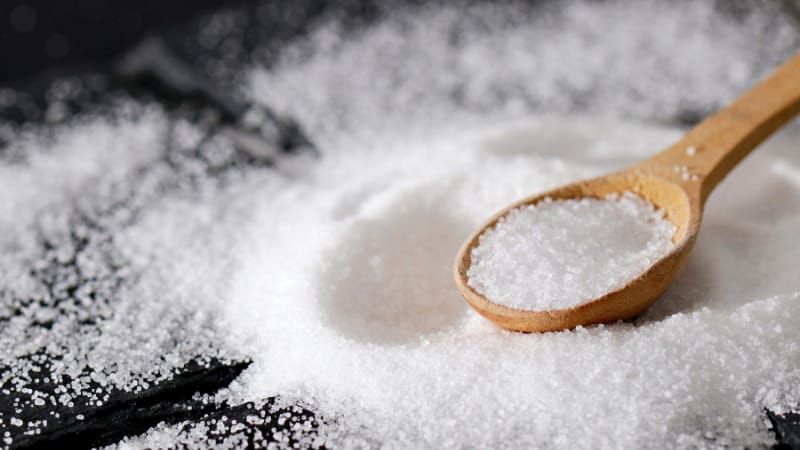
One of the best homemade insecticides is salt spray. It deters pests, but it’s also beneficial to the plant. It increases nutrition absorption, such as sulfur and magnesium.
Your plants will thank you for using the salt spray.
Using Salt as a Pesticide and Fertilizer
You can sprinkle some salt around the base of the plant every week. This will deter the pests and help add magnesium to the soil, which will increase the plant nutrient absorption.
You can also make a spray. Mix half a cup of salt in one gallon of warm water. Pour into a spray bottle, stir well until the salt dissolves, and spray on pest-infected plants.
The salt will prevent the insects from sitting on your plant and feeding off of it by drying them out.
What Is Salt Spray Good Against?
Salt spray is good against slugs, beetles, and cabbage worms.
9. Apple Cider Vinegar Spray
Vinegar’s acidity can repel or kill certain small pests, but it can also burn plant tissue quickly. It’s best treated as a targeted, careful-use option rather than a broad foliage spray.
Apple cider vinegar is essentially fermented apple juice. It’s been used as a home remedy for a long time, but it’s also an effective organic bug repeller.
Moreover, it won’t only repel the bugs, but it can give new life to your flowers, veggies, and fruits by getting rid of harmful insects altogether due to its acidity.
Mixing Vinegar for Garden Pests
You can use either white or apple cider vinegar, but white is usually more affordable.
To make a spray, combine three parts water and one part vinegar in a spray bottle. Add a teaspoon of soap dish to help bind the solution. Shake until well combined and all the ingredients are mixed.
Spray directly onto the bug, or apply to the base of the plant. You can also apply to leaves if they are heavily infected.
You can also use vinegar to repel dogs, cats, and coyotes from your garden.
What Does Vinegar Kill?
Vinegar is good against slugs, snails, moths, ants, and fruit flies.
Pro Tip: You can also use vinegar to kill weeds. Mix 50-50 vinegar and water and spray directly on weeds. If you have grass you want to get rid of, such as grass growing through cracks on the walkways, you can also spray it with vinegar.
10. Rubbing Alcohol Spray
Rubbing alcohol can kill some pests on contact, especially when applied directly and carefully, but it can also damage leaves if misused. Emphasize spot-testing and targeted application over blanket spraying.
70% rubbing alcohol is another excellent natural pesticide.
There’s some controversy around this one. I’ve encountered many claims it should be applied on a cotton swab and then dab mealybugs and their eggs. This doesn’t work because it won’t affect mealybugs in the microscopic, juvenile stage.
I found rubbing alcohol works much better when applied in a spray.
Not only will rubbing alcohol kill the insects, but it also draws out the mobile insects from their hiding places, so it’s easier to control and get rid of them.
How to Use 70% Alcohol on Plants
Mix 1 cup of rubbing alcohol and 1 teaspoon of dish detergent in 1 quart of water. Pour into a spray bottle, and shake to make sure it’s well mixed.
The alcohol melts the protective wax covering parts of insects and dries out their bodies.
Spray the mix on stems, leaves on both sides. Pay special attention to leaf axils, as pests tend to hide here.
What Is Rubbing Alcohol Good Against?
Rubbing alcohol is good against aphids, thrips, whiteflies, and mealybugs. It’s mostly effective against adults, but it can sometimes work on eggs and pupae too.
Read More:
11. Diatomaceous Earth (DE)
Diatomaceous earth is a mineral powder that helps control crawling pests by dehydrating them. It works best when kept dry and reapplied after rain, and it should be applied carefully to avoid harming beneficial insects.
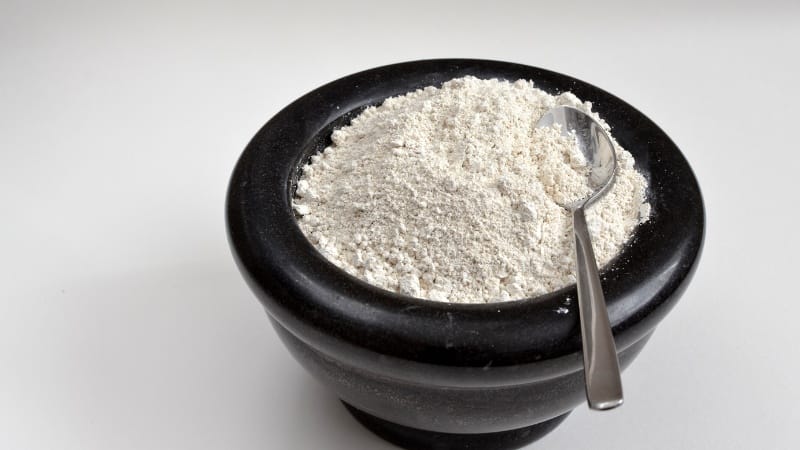
Diatomaceous Earth is a natural substance. It comes from a sedimentary rock, and it’s made up of bodies of prehistoric diatomic fossils.
When these fossils are ground-up, they are very sharp, and it feels like razor blades on the insect respiratory systems. It effectively dehydrates the insects to death.
Diatomaceous earth has many uses, and a pesticide is only one of them.
How to Dust Plants with Diatomaceous Earth
You can find diatomaceous earth in garden stores. There are different versions of diatomaceous earth, so make sure to get the horticultural grade.
It’s usually sold in large bags, which doesn’t work if you have a small garden (like me). In this case, you can split it with your friends, family, or neighbors.
Put on a mask and gloves, and dust the ground around your plants with it, or put it around the garden bed you want to protect. You can also sprinkle some on the foliage to control the crawling insects.
Because diatomaceous earth has a dried-out nature, you’ll have to reapply it after every rain.
What Is Diatomaceous Earth Good Against?
Diatomaceous earth is good against snails, ants, and slugs.
Pro Tip: Use a brush or a small spoon if you want to get it into cracks — for example, to stop ants from crawling out. If you want to cover a bigger area, use a flour sifter.
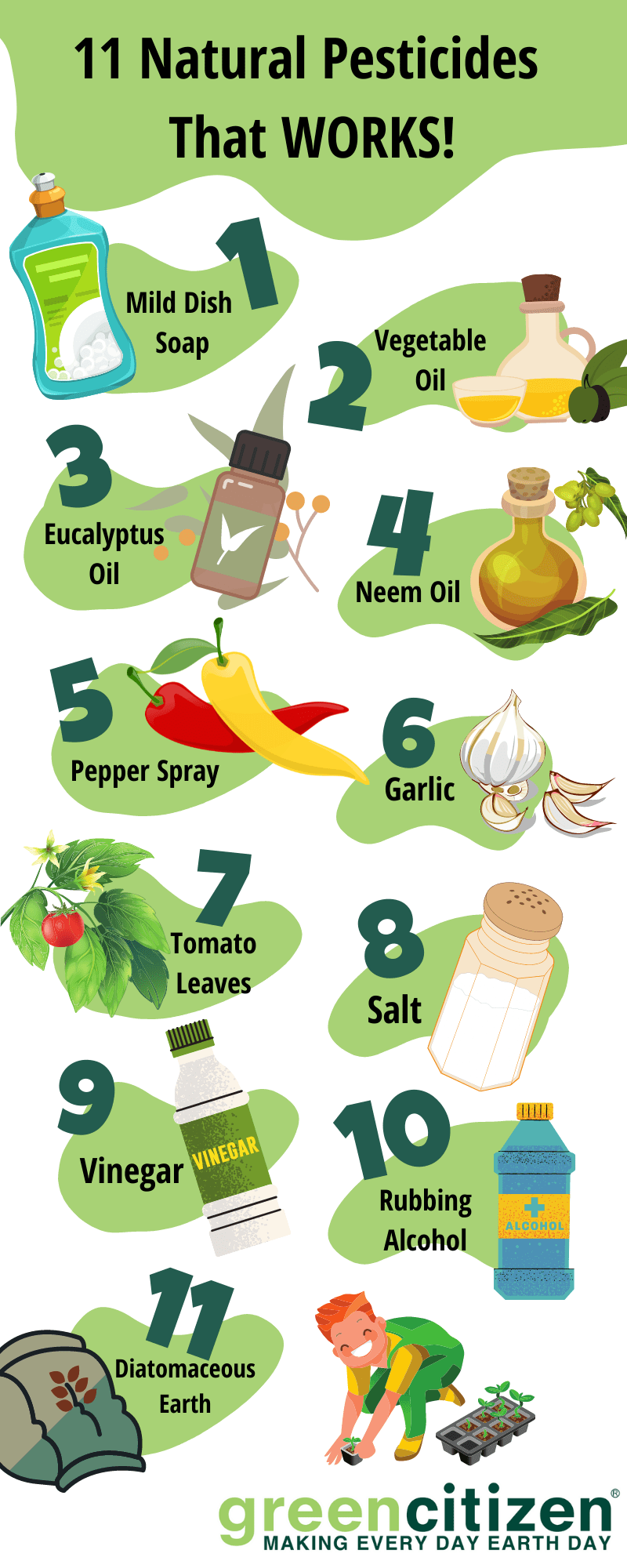
Tips and Tricks to Follow for Best Use of Natural Pesticides
Always spot-test first, avoid spraying in midday heat, and reapply only as needed—natural pesticides can harm beneficial insects too. Keep kids and pets away until dry, and avoid spraying open blooms to protect pollinators.
There’s one important thing to note about natural pesticides — same as chemical pesticides, they’ll kill all bugs they come in contact with, be it a pest or a beneficial bug.
Before you reach for a pesticide, think about how much damage the insects are making in your garden. You could potentially end up causing more harm than good to the plant if you use pesticides.
Here are some tips and tricks to follow for optimum natural pesticides use:
- Before you use a homemade mix, always test it out on a small portion of the plant to make sure it won’t harm it. Wait for a couple of days. If there’s no change, proceed with the application.
- Don’t use soaps or detergents that have bleach in them, as this will harm the plant.
- Never overdo the application. In most cases, it’s best to stick to the top and underneath the leaves.
- Most homemade natural pesticide recipes should be used once a week. If you use too much, you may end up killing the beneficial bugs, such as bees and ladybugs. A good rule to follow: if there aren’t any results in 7 days, start applying the mix every 5 days.
- If the forecast says it’ll rain, delay using the pesticide as the rain will wash it off.
- If it recently rained, wait until the plant is dry to apply the pesticide, to not dilute the mix.
- Make sure your pets stay away from the area when you apply the pesticide and until it dries.
- Get rid of diseased leaves before spraying.
Why opt for Natural Pesticides Instead of Synthetic Ones?
Many gardeners choose natural pesticides to reduce chemical exposure, protect soil health, and lower environmental impact. They can be effective, but usually require more consistency and better timing than synthetic options.
Have you ever noticed pesky bugs munching on your lovely garden plants? These little critters do more than just snack on your greens – they bring along germs and diseases that can wreak havoc on your beautiful garden and carefully planned landscaping. It’s a problem many of us face, and I’ve certainly battled my fair share of garden pests!
The go-to solution for many gardeners is synthetic pesticides. These are chemicals specifically engineered to knock out those troublesome insects. Walk into any gardening store, and you’ll likely see shelves stocked with these man-made concoctions.
They’re popular because they’re powerful, but that power comes with a hefty price.
Take chlorpyrifos, for example. Once widely used, it was banned in 2020 after being linked to serious health risks.
In contrast, natural pesticides offer a safer alternative. Derived from plants, minerals, or other organic sources, they aim to eliminate pests while being gentler on the environment and safer for humans and animals. Although still toxic to pests, they’re significantly less harmful to everything else.
From my experience, switching to natural pesticides has been a game-changer. They effectively manage pests without the environmental guilt or health worries associated with synthetic options. Plus, using them feels more in harmony with nature.
To sum up, when faced with the choice between synthetic and natural pesticides, consider the latter for a safer, environmentally friendly, and effective solution to protect your beloved garden. Just as they’ve worked wonders in my garden, they could do the same for yours, keeping it healthy and thriving without the nasty side effects.
Why Choosing Natural Pesticides is a Smart Move
Choosing organic pest control improves soil health and biodiversity. Natural pesticides for the garden allow beneficial microorganisms and predatory insects to thrive, creating a balanced ecosystem where plants can build their own natural resilience against future infestations.
Embracing natural pesticides in your garden brings a bouquet of benefits that I’ve come to appreciate in my own green haven. Here’s why they’re such a great choice:
Eco-Friendly Impact
Switching to natural pesticides is like giving Mother Nature a big thumbs up. These organic options are more harmonious with the environment. By choosing them, you’re stepping into the role of an eco-warrior, reducing your carbon footprint, and contributing to a greener planet. It’s a small but powerful way to make a positive environmental impact.
A Healthier Choice
If you’re like me, tending a garden where your food grows, you’ll find natural pesticides to be a health-conscious choice. They ensure that the fruits and veggies you nurture are safer to eat, not just for you but for your pets and family too. I’ve noticed how switching to natural methods has given me peace of mind, knowing my garden’s bounty is free from harsh chemicals.
Improved Soil Quality
One aspect of gardening that’s often overlooked is soil health. Natural pesticides are kinder to the earth beneath our feet. They reduce the risk of contaminating the soil, leading to healthier plant growth. In my experience, plants just seem happier and more vibrant in soil that’s been treated with care and respect.
Effective in the Long Run
A fascinating benefit of natural pesticides is their sustainability. Pests are less likely to develop resistance to these organic solutions compared to synthetic ones. This means you can use them season after season with consistent effectiveness. It’s a long-term relationship between your garden and natural pesticides, one that grows stronger with time.
Which Natural Pesticide Should You Use?
Choose based on the pest and the plant: soft-bodied pests often respond to soap/oil approaches, crawling pests can be reduced with mineral barriers, and repellents work best as prevention.
You can choose any natural pesticides on this list, and you won’t make a mistake. They’ve been a lifesaver for my garden.
Think about what kind of bugs you want to get rid of. Many of these pesticides work on the same type of bugs — for example, pretty much all of them are guaranteed to kill aphids. On the other hand, if you want to get rid of cabbage worms, go for salt spray, for slugs use vinegar, and so on.
Soon you’ll have a pest-free garden, and best of all, you’ll achieve it in a way that’s good for the environment and doesn’t harm the animals or yourself.
If you have any questions about natural pesticides, or you’ve used them yourself, let me know in the comments below. I’m always on the lookout for new natural pesticide ideas!
